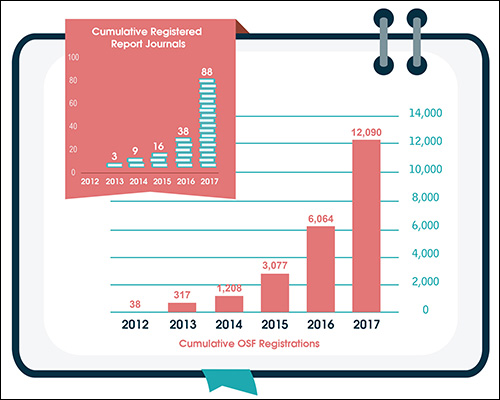
The Preregistration Challenge was launched in 2016 as an education campaign designed to initiate a new habit among empirical researchers. Now that the Challenge is in its closing chapter, the final prizes will be awarded in December 2018, it is a good time to reflect on what has been accomplished so far and what is coming next. Since launching this campaign, preregistration has caught fire among researchers. Over 2,200 researchers have entered the Prereg Challenge, with over 30% of entrants submitting more than one preregistration.
Preregistrations have come from every corner of the scientific community. Ecologists, political scientists, linguists, evolutionary biologists, neuroscientists, geneticists and researchers in education and finance have taken the Challenge. There have been partner initiatives to support preregistration within specific communities. And of course, the real credibility revolution has occurred within the psychological sciences. Social-personality and cognitive psychologists know better than most how bias can affect us, and have preregistered in droves.
The Prereg Challenge is a rigorous preregistration process including review. Other options for preregistration are available on OSF, and growth across all of them has been tremendous. The figure below from a recent article in the APS Observer highlights this trend.

We learned a tremendous amount about the process of preregistration throughout this campaign, and will be applying those lessons in the future. Preregistration is new and unfamiliar to most researchers. Active guidance through our review process helped many to improve their research plan, and helped us to improve the process and our education materials. Going forward, we remain committed to supporting researchers who want to preregister, either through quick discussions on social media, or through comprehensive statistical and methodological consulting. We also are seeing a growing body of expertise on preregistrations, between those who are evaluating it as a process (as Coosje Veldkamp, https://psyarxiv.com/g8cjq/, and Tom Hardwicke and John Ioannidis https://osf.io/preprints/bitss/fzpcy/ are doing) and those who are creating guides, templates (such as the one created by Kevin McIntyre and Benjamin Le at Project TIER https://osf.io/n39tr/), and other resources to support preregistration (such as principles of secondary data analysis being curated by Sara Weston: https://osf.io/cgw86/).
We are committed to continually improving the registration process to encourage clear and rigorous preregistrations. The most exciting work that is on our development roadmap will be a major improvement to OSF Registries. Right now, OSF Registries helps researchers discover registrations on OSF and other registries such as clinicaltrials.gov. Soon, OSF Registries will enable communities to launch and manage their own registries to establish their own standards and moderate submissions. And because of SHARE, there will be no risk of fragmentation, registrations created in one community will be discoverable by any other. Another improvement on the roadmap for development includes a way to make deviations from preregistered plans more transparent and trackable.
Like all good things, the Preregistration Challenge will end. Papers must be published and award claims submitted by December 31, 2018 to be eligible for a prize. However, this is clearly only the beginning for preregistration more generally. This flash-in-the-pan campaign helped to raise awareness about registration and provide experience that will help improve the quality of the registration process and the resulting research. Now we are transitioning to fostering the growth and quality of preregistration toward becoming a normal part of the research lifecycle for everyone.

6218 Georgia Avenue NW, Suite #1, Unit 3189
Washington, DC 20011
Email: contact@cos.io

Unless otherwise noted, this site is licensed under a Creative Commons Attribution 4.0 International (CC BY 4.0) License.
Responsible stewards of your support
COS has earned top recognition from Charity Navigator and Candid (formerly GuideStar) for our financial transparency and accountability to our mission. COS and the OSF were also awarded SOC2 accreditation in 2023 after an independent assessment of our security and procedures by the American Institute of CPAs (AICPA).
We invite all of our sponsors, partners, and members of the community to learn more about how our organization operates, our impact, our financial performance, and our nonprofit status.